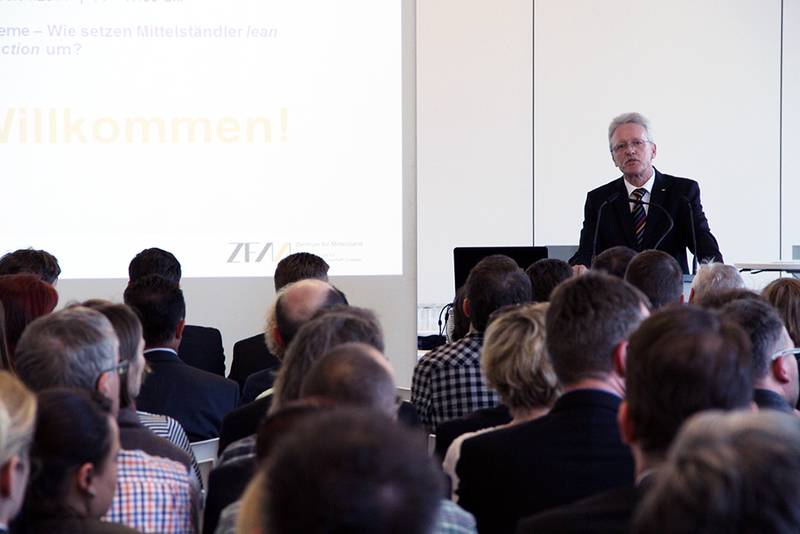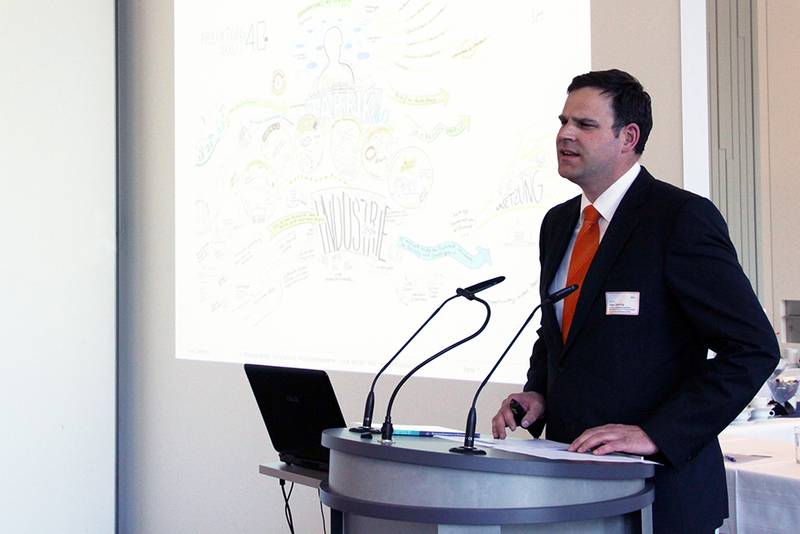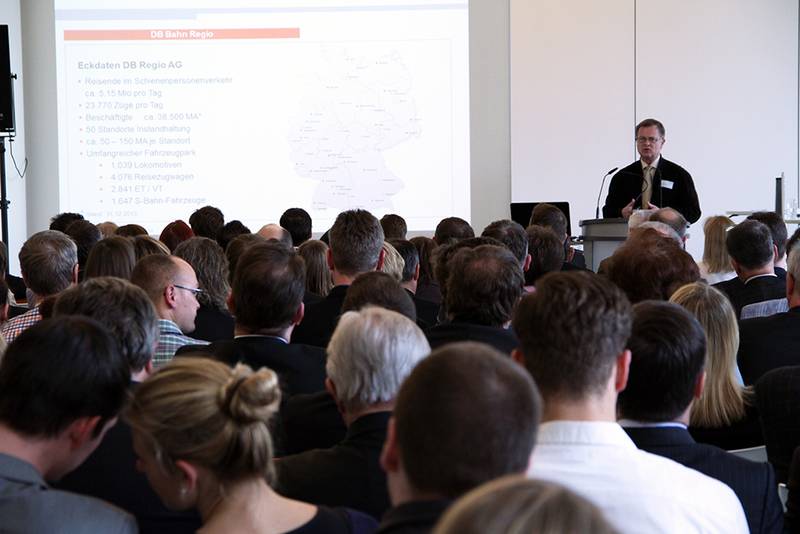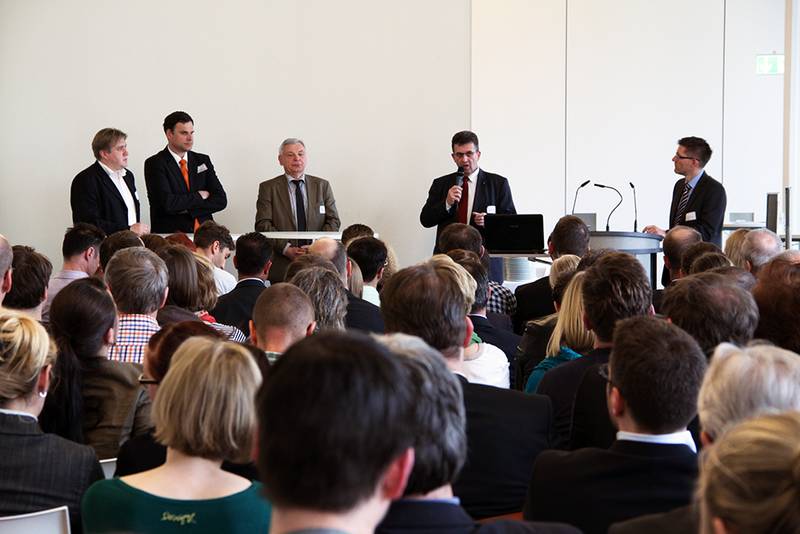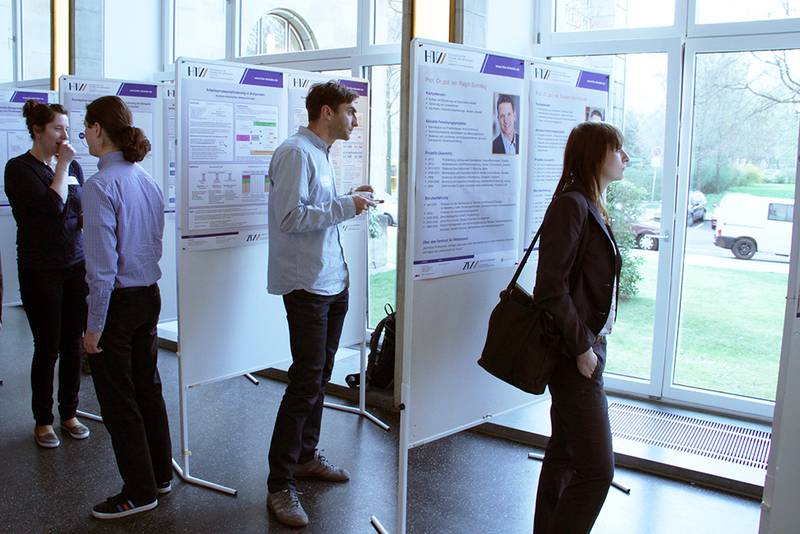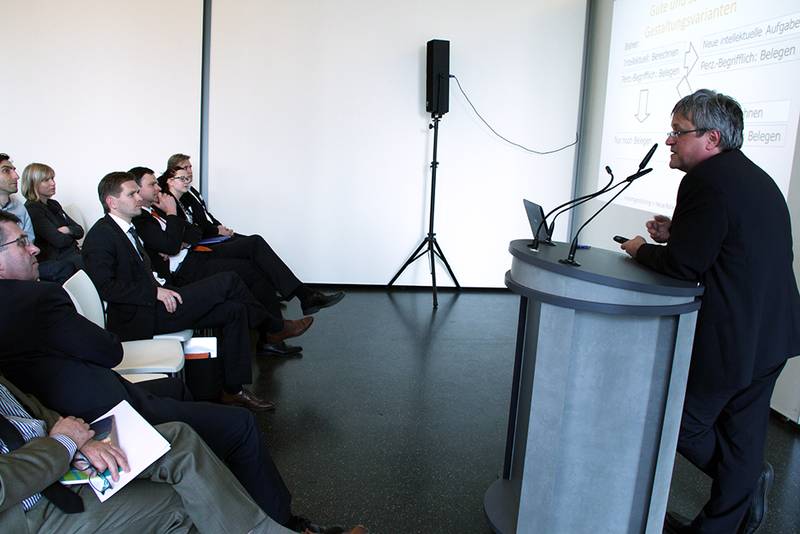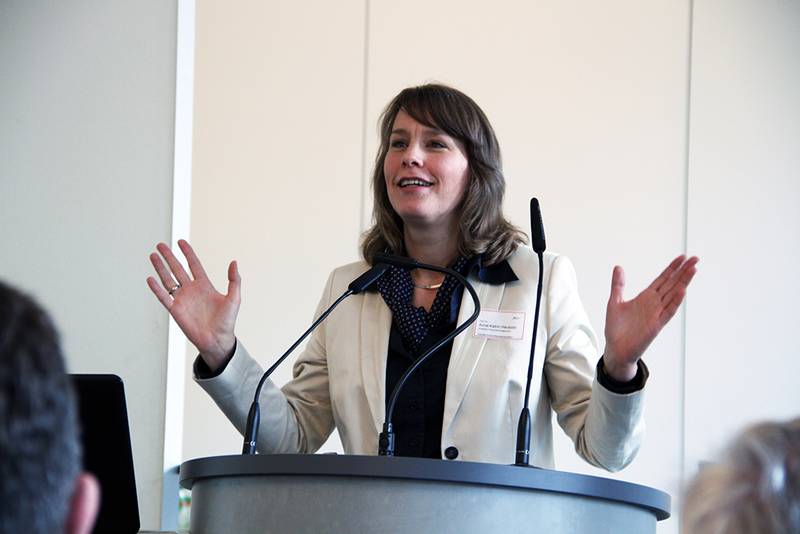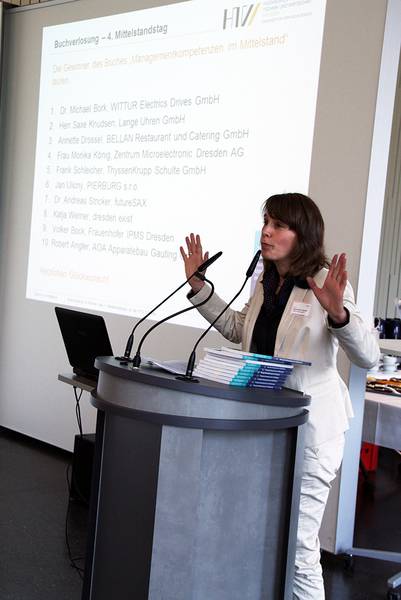![[Translate to English:] Blick in eine Produktionshalle](/fileadmin/HTW/Fakultaeten/Wirtschaftswissenschaften/ZFM/4.MST/Fabrikhalle.jpg)
4th SME Day 2014
Holistic production systems - How SMEs implement lean production!
Thursday, 3 April 2014, 14:00-18:00 hrs
More than 140 representatives from companies, organisations and associations as well as the university took part in the 4th SME Day of the Faculty of Business and Economics. The theme of this year's event was production optimisation using the systematic approach of a Holistic Production System. "While the penetration of this management tool is almost 100% in some sectors of large companies, there are still many opportunities for development, especially for medium-sized companies," said Prof. Gestring from Zentrum für Mittelstand.
Holistic production systems are a further development of the lean-production philosophy coined by Toyota with instruments of innovative work organisation such as group work and cross-departmental process management. Various standardised methods are available in this management framework. The Trumpf Group has been working on this topic for well over a decade at its Neukirch site with the SYNCHRO production system. With the participation of all employees in the company, significant improvements have been achieved, especially in throughput time and productivity. The requirements for the expansion of the product range and the development of new markets could thus be managed.
"Think about a demography-proof production system". This was the request of Dr. Holger Naduschewski, Managing Director of the Volkswagen Training Institute. Appropriate investments in assembly aids such as rolling stools as well as targeted training of older employees can maintain their ability to work for longer. This benefits both employees and employers.
Employee participation through group workshops as part of a continuous improvement process is one way to optimise processes. In addition, systematic process planning is also possible with the help of MTM (Methods Time Measurement). Henry Röder from Deutsche Bahn Regio AG and Dr. Bernd Britzke from MTM-Gesellschaft presented how success can be achieved in the area of maintenance through cross-site standardisation and early integration of the MTM philosophy into work planning.
During the break, many entrepreneurs took the opportunity to talk to the speakers. In addition to running businesses, the topics of start-ups and innovation, represented by the dresden exists initiative, as well as business succession in the area of the IHK's Folgerichtig action were the focus of attention. Information about various final theses and dissertations by students of the HTW Dresden was provided in the context of a poster presentation.
The medium-sized pharmaceutical company Apogepha from Dresden was forced to review its production processes due to ever shorter delivery times. Ms. Katharina Kuhlee, a graduate of the HTW Dresden, reported on the success in reducing throughput times by means of value stream planning as well as a systematic increase in plant availability. The foundation for this was laid during her internship and final thesis in the company.
Very few companies introduce a production system without consultants. Uwe Wenzel, managing director of the logistics consulting company logsol from Dresden, reported on the type of involvement and its results. Like the previous speakers, he emphasised the importance of involving employees in the change process. Prof. von der Weth's lecture focused on the role employees can play in this process and the special features managers need to be aware of. Standardised processes help one employee, while another employee feels constrained by them. Therefore, employees and their workplaces must be differentiated in such a way that individual performance is neither under nor overtaxed.
The next SME Day at the HTW will take place in April 2015.
Agenda
2.00 p.m. welcome
- Prof. Roland Stenzel, Rector of the HTW Dresden
- Prof. Ralph Sonntag, Dean of the Faculty of Economic Sciences
Part 1: Benefits of a production system in SMEs
2:15 p.m. Holistic production systems in small and medium-sized enterprises - an introduction
Prof. Ingo Gestring, Chair of Materials Management and Production Logistics
- Structure of a Holistic Production System
- Optimisation potential and measurement of success
- Concepts and costs during introduction
2:30 p.m. Systematic Productivity Increase in Medium-Sized Enterprises
Henry Röder, Deutsche Bahn Region AG and Dr Bernd Britzke, MTM Institute
- Reduction of waste, basic rules of process design
- Creating transparency; making performance targets transparent, modelling or simulation of work processes, target processes show potentials
- Involving employees, ergonomic work design as a contribution to mastering demographic change, developing project work
- Modelling and simulation of work processes; use of MTM, operational examples
2:50 p.m. Success factors of the SYNCHRO production system from Trumpf
Dipl.-Ing. Uwe Kretzschmar, Trumpf Sachsen GmbH
- Overview of the SYNCHRO production system
- Control and development of production at the Neukirch site
- Tasks/competences/responsibilities - Role play in the team
- Practical example
3:10 p.m. Designing Demographically Resilient Companies - Requirements for Future Production Systems
Dr. Holger Naduschewski, Managing Director Volkswagen Educational Institute Zwickau
- Socio-demographic change - Saxony region, Germany, world
- Presentation of strategic fields of action for demographic resilience, (lifelong learning, organisational and personnel development, health management, age structure analysis, knowledge transfer, development of productivity and efficiency)
- Requirements for the design of production systems of the future (examples from practice), workplace and working environment design, ergonomics, qualification
3:30 p.m. Moderated panel discussion
- Moderated by Prof. Torsten Gonschorek, Chair for Medium-Sized Enterprises, HTW Dresden
3:45 p.m. Poster presentations and break discussions
Part 2: Implementation of production systems in medium-sized companies
4:15 p.m. Value stream mapping and OEE in a medium-sized pharmaceutical company
Katharina Kuhlee, B. Eng., APOGEPHA Arzneimittel GmbH, Dresden
- Business model of APOGEPHA Arzneimittel GmbH
- Market economy environment and its impact on value creation of the company
- Formulation of optimisation strategies
- Carrying out a value stream analysis and calculating the Overall Equipment Effectiveness
- Impact on lead time, adherence to delivery dates and flexibility
4:35 p.m. "Lean Logistics – How can a logistics planning company support the introduction of lean elements?“
Dipl.-W-Ing. Uwe Wenzel,General Manager LOGSOL GmbH Dresden
- Smart people. Great solutions. A brief profile of LOGSOL GmbH.
- Lean Logistics as an optimisation module
- Elements of Lean Logistics
- Opportunities and risks for medium-sized companies.
- Practical implementation examples
4:55 p.m. People as a resource - the role of the employee in process innovations
Prof. Rüdiger von der Weth, Chair of Human Resources and Labour Science
- The role of people in modern production systems
- Forms of employee competence, benefits of such competences in the work system
- Positive and negative emotions in change, Consequences for project management in process innovations, Successful integration of qualification measures in such projects
- Implementation in the context of small and medium-sized enterprises, Sustainable human resource development strategies for small and medium-sized enterprises, What should be done first?
5:15 p.m. Moderated panel discussion
Moderated by Prof. Anne-Katrin Haubold, Chair of Human Resource Management, HTW Dresden


